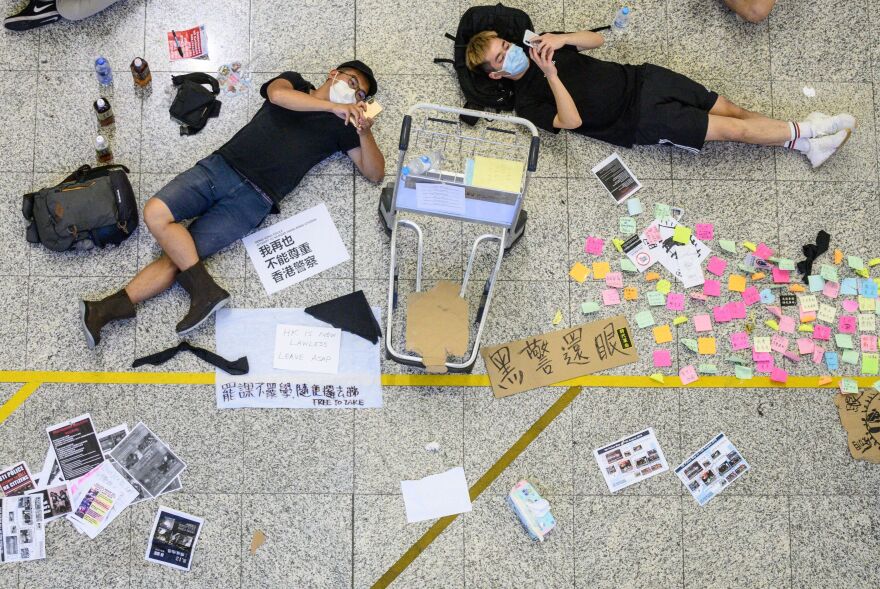Updated at 10:11 a.m. ET
Thousands of demonstrators, wearing black clothing and carrying posters denouncing the police, filled the arrival and departure halls of Hong Kong International Airport on Monday, prompting the cancellation of more than 100 flights at one of the world's busiest transportation hubs.
Some protesters began leaving later in the day, and China condemned the protests as "signs of terrorism."
The rally followed what was supposed to be a three-day sit-in starting Friday, amid the 10th straight week of pro-democracy protests. But a weekend of peaceful demonstrations across Hong Kong descended into chaos and violence.
Protesters accused the police of using aggressive tactics in an escalating attempt to suppress them — beating people and firing rubber bullets at close range. Police fired tear gas into an enclosed subway station, with the gas stagnating instead of dispersing. One woman was reportedly injured by a projectile that hit her eye — and she became the focal point on Monday for protesters, who carried signs on her behalf.
Hundreds of protesters were arrested. Allegations also emerged that police donned clothing worn by protesters to deliberately incite violence, NPR's Anthony Kuhn reported from Hong Kong.

Police appealed for calm as demonstrators gathered Saturday outside China's military garrison and set fires near a police station. Police said they were defending themselves against attacks and accused demonstrators of intentionally shining laser beams at officers, causing eye injuries.

On Monday, some protesters at the airport said they hoped the highly visible location, with foreigners passing through, might offer some protection against potential police brutality.

One Hong Kong carrier, Cathay Pacific, recently notified staff that they could be fired for supporting the protests, according to Agence France-Presse.

The unrest started in June, triggered by a bill that would have allowed China to extradite people from Hong Kong. The measure sparked fears that Hong Kong residents could be prosecuted by Beijing courts. Hong Kong's chief executive, Carrie Lam, declared the bill "dead" after protests broke out, but the measure has not been fully withdrawn. Protesters have expanded their demands for broader reform.
"The Hong Kong government's response has been a resounding 'no' to all protesters' demands and also a repeated strong condemnation of protesters, painting them in a broad-brush stroke as all radical, all being violent," Quartz reporter Mary Hui told NPR.
In Beijing, a spokesman for the Hong Kong and Macau Affairs Office told Hong Kong media on Monday that the protests bore "signs of terrorism." Yang Guang said "radical protesters" repeatedly attacked police officers and that violence must be combated according to the law, "with no hesitation or mercy."
China's state-controlled Global Times tweeted video footage of armored vehicles, saying it was evidence of China's armed police assembling in Shenzhen, a city bordering Hong Kong, "in advance of apparent large-scale exercises."
Protesters began to leave the airport Monday evening, as rumors spread of a police clearance operation. But some protesters stayed, appearing to be digging in for the long haul. Kuhn reports that little police presence and no riot police were seen at the airport as night fell.
Some flights appeared to be delayed instead of canceled, in an indication that the airport may be returning to a normal routine.
Hong Kong International Airport, which was built on an artificial island, saw nearly 75 million passengers last year, according to International Airport Review.
Hong Kong, once a British colony, returned to China in 1997 under a "one country, two systems" system. The city was promised "a high degree of autonomy" for 50 years.
Copyright 2021 NPR. To see more, visit https://www.npr.org.




